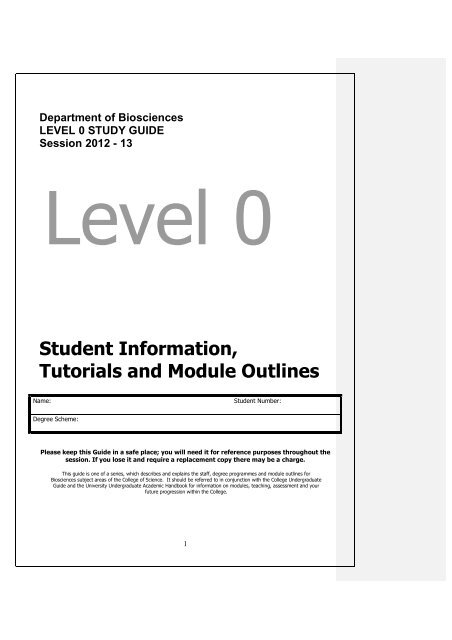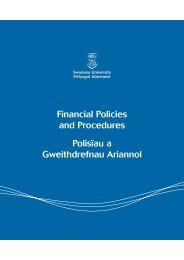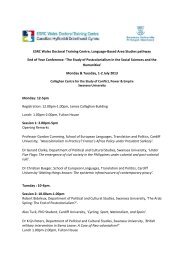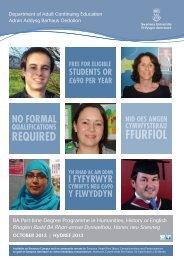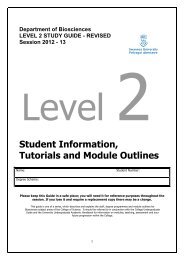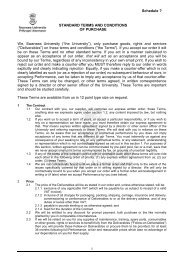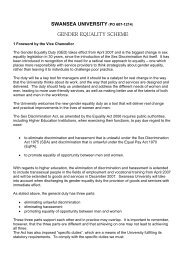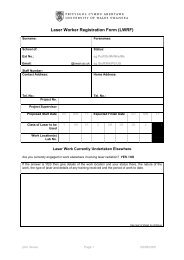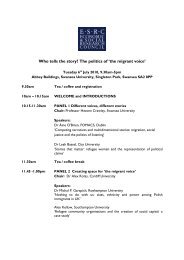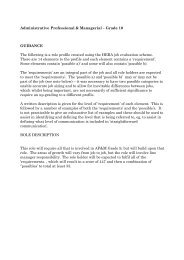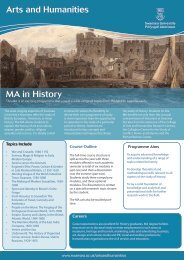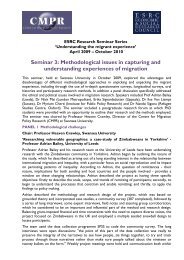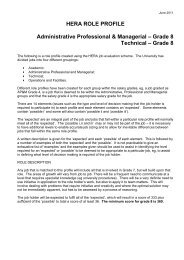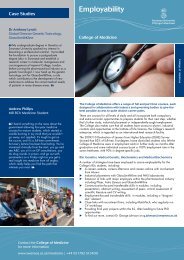Level 0 Study Guide 2012-13 Biosciencex - Swansea University
Level 0 Study Guide 2012-13 Biosciencex - Swansea University
Level 0 Study Guide 2012-13 Biosciencex - Swansea University
Create successful ePaper yourself
Turn your PDF publications into a flip-book with our unique Google optimized e-Paper software.
Department of Biosciences<br />
LEVEL 0 STUDY GUIDE<br />
Session <strong>2012</strong> - <strong>13</strong><br />
<strong>Level</strong> 0<br />
Student Information,<br />
Tutorials and Module Outlines<br />
Name:<br />
Student Number:<br />
Degree Scheme:<br />
Please keep this <strong>Guide</strong> in a safe place; you will need it for reference purposes throughout the<br />
session. If you lose it and require a replacement copy there may be a charge.<br />
This guide is one of a series, which describes and explains the staff, degree programmes and module outlines for<br />
Biosciences subject areas of the College of Science. It should be referred to in conjunction with the College Undergraduate<br />
<strong>Guide</strong> and the <strong>University</strong> Undergraduate Academic Handbook for information on modules, teaching, assessment and your<br />
future progression within the College.<br />
1
DISCLAIMER<br />
The Department has made all reasonable efforts to ensure that the<br />
information contained within this publication is accurate and up-todate<br />
when published but can accept no responsibility for any errors<br />
or omissions.<br />
The Department reserves the right to revise, alter or discontinue<br />
degree programmes or modules and to amend regulations and<br />
procedures at any time, but every effort will be made to notify<br />
interested parties.<br />
It should be noted that not every module listed in this handbook<br />
may be available every year, and changes may be made to the<br />
details of the modules.<br />
You are advised to contact the Department directly if you require<br />
further information.<br />
DATES OF TERMS<br />
24 September <strong>2012</strong>– 14 December <strong>2012</strong><br />
7 January 20<strong>13</strong> – 22 March 20<strong>13</strong><br />
15 April 20<strong>13</strong> – 14 June 20<strong>13</strong><br />
SEMESTER 1<br />
1 October <strong>2012</strong> – 25 January 20<strong>13</strong><br />
SEMESTER 2<br />
28 January 20<strong>13</strong> – 14 June 20<strong>13</strong><br />
The 20<strong>13</strong>/2014 academic year begins on 26 th September 20<strong>13</strong><br />
2
Contents<br />
STUDYING AT SWANSEA 4<br />
Introduction to Biosciences 4<br />
Biosciences Staff 4<br />
Biosciences Support Staff 5<br />
Departmental Facilities 5<br />
Communication 6<br />
Programmes of <strong>Study</strong> 7<br />
Outline of Specifications for Single Honours Programmes 8<br />
Outline of Programme specifications for Biology foundation 10<br />
Programme<br />
Opportunities for <strong>Study</strong>/Work Abroad Placements 11<br />
Transcripts and Diploma Supplements 11<br />
Transfer of Programme and Modules 11<br />
Personal Tutors 12<br />
Attendance Policy 15<br />
MODULE CONTENT 16<br />
Introduction 16<br />
Teaching Methods 16<br />
Methods of Assessment and Learning Outcomes 18<br />
Assessment Requirements of a module 18<br />
Procedures for Submitting Assessed Work 19<br />
Feedback 20<br />
Re-assessment 20<br />
Illness during the exam period 20<br />
Policy on extenuating circumstances affecting assessment 20<br />
Students with extenuating circumstances and/or special 25<br />
requirements<br />
Appeals Procedure 26<br />
Verification Procedures 27<br />
Use of Animals in Teaching – Policy Statement 27<br />
Biology <strong>Level</strong> 0 module catalogue 28<br />
Appendix 1 – Self Certificate Biosciences 40<br />
3
INTRODUCTION TO BIOSCIENCES<br />
STUDYING AT SWANSEA<br />
The purpose of this Handbook is to provide you with information on all stages of your academic<br />
programme at level 0. We hope that it will answer many of your questions. However, if, after<br />
reading it, you still have some unanswered queries, please feel free to discuss these with Dr Dan<br />
Forman, the degree coordinators and/or your personal tutor who will be assigned to you soon after<br />
the start of the first term. You should also consult the College Undergraduate Taught Awards<br />
Handbook and the <strong>University</strong>’s Academic Handbook for Undergraduate Taught Awards<br />
20012/20<strong>13</strong>.<br />
BIOSCIENCES ACADEMIC STAFF<br />
Head of Department:<br />
Programme Director:<br />
Professors:<br />
Senior Lecturers:<br />
Lecturer:<br />
Senior Tutor :<br />
Tutors:<br />
Rory P Wilson BA MA Oxford PhD Cape Town<br />
Dan W Forman BSc Coventry PhD Wales<br />
Paul F Brain BSc PhD Hull FIBiol (part-time)<br />
Tariq M Butt BSc PhD Bristol<br />
Kevin J Flynn BSc PhD Wales<br />
Graeme C Hays BSc Southampton PhD Aberdeen<br />
Andrew F Rowley BSc PhD DSc Wales<br />
Carlos Garcia de Leaniz BSc Victoria PhD Aberdeen<br />
Charles R. Hipkin BSc PhD Wales (part-time)<br />
Patricia L M Lee BSc Concordia DPhil Oxon<br />
Dan Eastwood BSc PhD Liverpool<br />
John Griffin BSc Nottingham MSc Bangor PhD Plymouth<br />
Mike Fowler BSc PhD Glasgow<br />
Andrew King BSc Cardiff PhD London and Zoological Society London<br />
Emily Shepard BSc Oxford PhD <strong>Swansea</strong><br />
John E Lancaster BSc PhD Wales (part-time)<br />
Wendy Harris BSc PhD <strong>Swansea</strong><br />
Ian M Horsfall BSc London MSc Southampton PhD Liverpool<br />
Penny Neyland BSc PhD Wales<br />
Laura Roberts BSc PhD Wales<br />
Gethin Thomas BSc Bangor MSc Liverpool School Tropical Medicine<br />
PhD <strong>Swansea</strong> (Welsh Language Tutor)<br />
As well as the staff listed above the following staff in the College of Medicine are involved in the<br />
delivery of Year 1 modules in Biosciences:<br />
Ed Dudley BSc PhD Wales (Senior lecturer)<br />
D. Hugh Jones BA, D.Phil Oxon (Senior lecturer)<br />
Colin J. Restall BSc PhD London (Lecturer)<br />
David O.F. Skibinski BSc (London), D.Phil (Oxon) (Professor)<br />
4
BIOSCIENCES SUPPORT STAFF<br />
Administrative Staff:<br />
Technical Staff:<br />
Mrs Liz Cozens<br />
Ms Hilary Jones – Teaching Technician<br />
Mr Keith Naylor – Boat Skipper<br />
Mr Ian Tew – Research/Teaching Technician<br />
Mrs Sarah Walmsley – Biolabs Technician<br />
Mr Jonathan Woodman-Ralph - Teaching Technician<br />
Teaching Administration Office<br />
The first source for student enquiries and information is the Teaching Administration Office in<br />
Room 122, Wallace Building<br />
This Office is open between the hours of 9.00am and 1.00pm Monday to Friday during term time<br />
and 10.00 am to 12.00 noon in vacations.<br />
Tel: +44 (0)1792 295332/ 295359<br />
Email: r.muxworthy@swansea.ac.uk / l.cozens@swansea.ac.uk<br />
DEPARTMENTAL FACILITIES<br />
Drawing & Poster Printing Service (Margam Room 028)<br />
This office can provide advice on all aspects of poster and illustration production. It also offers a<br />
printing service of A1 and A0 documents (£10.00 A1 and £15.00 A0). Posters must be<br />
submitted on a USB stick. Please note there is a three working-day turnaround for this service.<br />
The final product must always be the work of the student.<br />
Computing Facilities<br />
The Department has modern, purpose-built computing laboratories with facilities for the full<br />
range of geographical operations. These laboratory are located in Wallace rooms 217 and 219b<br />
and are principally for instruction and student use. Access to the rooms are via your student card<br />
which can be programmed by visiting Wallace Room 202 between 3.00 pm and 4.00 pm during<br />
the start of term, but which will reduce to 3.30 pm and 4.00 pm each week day. Assistance with<br />
computing facilities may be obtained from staff (Wallace Room 223).<br />
Food and drink are prohibited within these computer rooms.<br />
Private <strong>Study</strong><br />
Students are welcome to use laboratories and lecture rooms for private study when these rooms<br />
are not being utilised for teaching.<br />
5
COMMUNICATION<br />
The Teaching Administration Office provides a number of services and functions, as follows:<br />
• To answer any queries relating to academic matters.<br />
• Receipt of medical certificates, self certification forms and other documentary<br />
evidence of adverse circumstances relating to academic performance.<br />
• Issue and receipt of the appropriate forms for Transfer of modules, Change of<br />
degree schemes, Suspension of studies and Withdrawal from schemes.<br />
• The collection and return of any other forms e.g. project/field course registration<br />
forms, safety forms, evaluation questionnaires, etc.<br />
• Submission of any forms requiring signature by a member of staff.<br />
• Enquiries regarding student absence from scheduled classes.<br />
Information is distributed and shared within the Department using a variety of methods including<br />
notice boards, the Web and email.<br />
Staff – Student Consultative Committee<br />
The Staff-Student Consultative Committee allows undergraduate students to bring any concerns<br />
that they have about any aspect of their Biosciences learning experience to the attention of the<br />
Biology Department. These concerns are discussed in Committee meetings and subsequently<br />
acted on further where this is considered appropriate. The Committee is chaired by a member<br />
of the teaching staff but its Secretary is a student. Whilst a small number of representatives<br />
from all undergraduate years are elected each year to serve on the Committee, meetings are<br />
open to all undergraduates taking Biology modules. The Committee meets approximately twice<br />
a term but the chair is also able to receive concerns from students at any time by email. The<br />
current Staff-student liaison officer is Dr Emily Sheppard.<br />
Career Development: <strong>Swansea</strong> Employability Academy<br />
Within the Department of Biosciences key employability skills (communication, leadership, team<br />
working, problem solving and presentation skills) are built into all aspects of our degree<br />
programmes. No <strong>Swansea</strong> Biosciences student reaches graduation without being exposed to<br />
many of the challenges they will face in the working world, such as leading a group of peers to<br />
complete a specific assignment or presenting work to their colleagues. The career prospects of<br />
our Biosciences graduates are good.<br />
Employability skills training is also supported through the <strong>Swansea</strong> Employability Award and the<br />
Department offers weekly support sessions for students enrolled on the Award programme. The<br />
Department of Biosciences has a dedicated Employability Tutor (Dr Laura Roberts) to support<br />
students as they make decisions about their future and to help them achieve their career goals,<br />
whether they wish to go on to a postgraduate degree program, successfully compete for a<br />
graduate employment position or pursue a gap year after graduation.<br />
The <strong>Swansea</strong> Employability Award (SEA)<br />
SEA SUPPORT SESSIONS : Monday, 10am , PC Room 14, Haldane Building.<br />
(web site: www.sea.swan.ac.uk)<br />
<strong>Swansea</strong> <strong>University</strong> offers an online Employability Award which, if completed, will appear on<br />
your degree transcript. The Award involves a series of online and works experience modules<br />
and can be completed at any time during your degree programme. However, you are<br />
encouraged to start the programme as early as possible in your degree programme. The award<br />
structure is outlined below. You can register to complete the award at the web address above<br />
and contact Dr L:aura Roberts (L.J.Roberts@swansea.ac.uk) for more details.<br />
6
PROGRAMMES OF STUDY<br />
For students pursuing a 4 year degree programme managed by Biosciences, the department is<br />
designated as your 'Home Department', which means that it is responsible for issues such as<br />
enrolment, tutor assignment, progression and examinations. From September 2011 the BSc<br />
Honours Degrees available to <strong>Level</strong> 1 students for which Biosciences is the 'Home Department'<br />
are shown below. In addition, the Department co-operates with other departments to offer Joint<br />
Honours Degree Programmes that combine studies in Biosciences with a non-biological subject.<br />
For these degree programmes the co-operating department has the role of 'Home<br />
Department'.<br />
Degree<br />
Route Code<br />
XBIOS<br />
UCAS<br />
Code<br />
C104<br />
Degree Programme<br />
Biology<br />
Degree Programme<br />
Coordinator<br />
Prof. R.P. Wilson<br />
XBIMS<br />
C160<br />
Marine Biology<br />
Prof. G.C. Hays<br />
XBIZS<br />
C300<br />
Zoology<br />
Prof A. F. Rowley<br />
Each of the degree programmes offered by the Department is described in detail in the<br />
Programme Specification for the degree scheme.<br />
Note: in accordance with the QAA, all programmes of study should be expressed in terms of<br />
Programme Specifications. Reference to these should be made to them here (and web links<br />
included where appropriate). You are reminded that the centrally held electronic record is<br />
considered by the <strong>University</strong> Learning and Teaching Committee to be the current version and it<br />
is the College’s responsibility to ensure that these are kept up-to-date.<br />
Additionally, if benchmark statements are available for your subject matter, Colleges are urged<br />
to include reference to either how your programmes already address the benchmarks, or the<br />
stage you have attained in reviewing your programmes in relation to your subject’s benchmarks:<br />
www.qaa.ac.uk/academicinfrastructure/benchmark<br />
7
OUTLINE OF PROGRAMME SPECIFICATIONS FOR SINGLE HONOURS PROGRAMMES<br />
Foundation <strong>Level</strong> Biology<br />
In Biosciences we currently offer three single honours degree schemes: BSc Biology (C104),<br />
BSc Marine Biology (C160) and BSc Zoology (C300). Our standard offer for entry onto these<br />
schemes is ABB which should including an A-level in Biology (or related subject). As a crucial<br />
component of the widening access and inclusivity strategy of the Biosciences Department and<br />
College of Science, this new degree scheme provides access to the BSc Biology degree (C104):<br />
(i)<br />
(ii)<br />
(iii)<br />
(iv)<br />
to applicants who have not gained sufficiently high grades at A level to enter directly onto<br />
the three year degree scheme;<br />
to applicants who lack past educational experience in Biology but have experience in a<br />
cognate discipline (e.g., chemistry, geography, environmental science, maths and<br />
physics) and wish to attain this foundation rather than enter at <strong>Level</strong> 1;<br />
to applicants who are deemed to lack sufficient relevant educational experience in<br />
cognate disciplines to enter onto the 3 year BSc Biology degree at <strong>Level</strong> 1; and<br />
to mature applicants and professional learners from non-traditional backgrounds who<br />
lack the formal educational qualifications but have relevant work experience.<br />
During the Science Foundation Year students study a pre-defined combination of 60 credits of<br />
compulsory science modules comprising: environmental science (10c), computing (10c), Physics<br />
(10c), mathematical analysis (20c) and key skills (10c) in the first teaching block, followed by<br />
modules in Geography (15c), Biology (15c), Computer Science (15c) and statistics (15c)<br />
modules in the second teaching block.<br />
Upon successful completion of the Science Foundation Year (Year 0), students enter onto <strong>Level</strong><br />
One of the three year BSc Biology degree (C104) and follow the existing pathway through the<br />
degree BSc Biology degree. At <strong>Level</strong> One of the programme study includes a set of compulsory<br />
modules accounting for 120 credits. These compulsory 120 credits include a wide range of<br />
topics, practical research and analytical methods, and academic skills modules. At level 2,<br />
students are required to take 90 credits of compulsory modules and have a free choice of<br />
modules worth 30 credits. They are able to access existing modules in the department’s portfolio<br />
for this level or elect to take modules that are external to the department. At <strong>Level</strong> Three<br />
students conduct a 30 credit research dissertation, a 20 credit literature review and 20 credits of<br />
compulsory modules. Students can select an additional 50 credits of modules from options<br />
spanning the diverse topics within Biology.<br />
Single Honours Degree Programmes in Biosciences<br />
Biology<br />
The aim of the degree course is to produce biologists, who do not wish to specialize in a single<br />
biological discipline, with a knowledge of basic principles and unifying concepts in biology. The<br />
objectives are to produce graduates who understand the structural, functional and phylogenetic<br />
relationships of living organisms and who appreciate the importance of IT and numeracy skills.<br />
www.swansea.ac.uk/biosci/undergraduatestudy/bscbiology<br />
8
Marine Biology<br />
The aim of the course is to provide an understanding of marine organisms and their interactions<br />
with the environment. The objectives are that by the end of the course students should be<br />
familiar with: the biology and interrelationships of marine organisms from microbes to mammals;<br />
field surveying and sampling techniques; planning and executing experiments in both the field<br />
and laboratory; presentation, IT and numeracy skills.<br />
www.swansea.ac.uk/biosci/undergraduatestudy/bscmarinebiology<br />
Zoology<br />
The aim of the course is to provide a rigorous foundation in animal form, function and ecology<br />
and to produce graduates well-qualified to undertake careers in many spheres of biology,<br />
commerce, education and the media. The objectives are to produce graduates who: have the<br />
ability to understand structural, functional and phylogenetic interrelationships of animals; are<br />
capable of designing and executing simple research experiments and are able to analyse<br />
experimental data. The course includes the development of IT skills together with training in the<br />
presentation of scientific data orally to peers.<br />
www.swansea.ac.uk/biosci/undergraduatestudy/bsczoology<br />
Biological Sciences with Deferred Specialisation (C100)<br />
Applicants who are unsure which degree scheme to choose can apply using this route.<br />
Students can defer choosing their degree scheme until the end of the first year at <strong>University</strong>.<br />
This is only applicable to schemes offered within Biosciences.<br />
www.swansea.ac.uk/biosci/undergraduatestudy/bscbiology<br />
Students entering the <strong>University</strong> commence their studies by taking a combination of <strong>Level</strong> 1<br />
modules during their first year with a total credit point value of 120. Please note that<br />
programmes of study within Biosciences do not allow elective modules to be pursued at<br />
level 1. Your personalised enrolment form will show the list of compulsory modules for your<br />
degree scheme.<br />
After <strong>Level</strong> 1, students study <strong>Level</strong> 2 (in their second year) and <strong>Level</strong> 3 (in their third year).<br />
9
OUTLINE OF PROGRAMME SPECIFICATIONS FOR BIOLOGY FOUNDATION<br />
PROGRAMME<br />
Teaching Block 1 Compulsory Modules (all 10 credit modules)<br />
Module<br />
MA-000<br />
MA-001<br />
CS-061<br />
GEB011<br />
GEB012<br />
EG-062<br />
PH-001<br />
Title<br />
Foundation Mathematics 1a<br />
Foundation Mathematics 1b<br />
Introduction to Computing<br />
Environmental Science<br />
Development of key skills for scientists<br />
Development of Key Skills<br />
Introductory Physics<br />
Teaching Block 2 Compulsory Modules (all 15 credit modules)<br />
Module<br />
GEG010<br />
CS-099<br />
BIO000<br />
BIO001<br />
Module Title<br />
Foundation Geography<br />
Computers Unplugged<br />
Foundation Biology<br />
Data Analyses and Presentation<br />
10
Opportunities for <strong>Study</strong>/Work Abroad Placements<br />
Staff within the department work with a range of individuals and organisations throughout the<br />
world and may be able to facilitate work or research-based placements for you. If you are<br />
interested in working or studying abroad during reading your degree in the department of<br />
biosciences please contact Dr D Forman (d.w.forman@swansea.ac.uk).<br />
TRANSCRIPTS AND DIPLOMA SUPPLEMENTS<br />
You can expect to receive an academic transcript at the end of your studies at <strong>Swansea</strong> which<br />
details the modules you pursued and the marks obtained. In addition to the transcript, the<br />
<strong>University</strong> produces a diploma supplement for all final year students. The diploma supplement is<br />
a document developed by groups within the European Commission that aims to facilitate<br />
academic and professional recognition of qualifications across Europe. It provides a description<br />
of the nature, level, context, content and status of the studies that were pursued and<br />
successfully completed by the individual named. It is expected that employers and higher<br />
education institutions will increasingly request this document from you when you begin applying<br />
for posts or further study.<br />
Information for Colleges: statement produced by Directorate-General for Education and Culture,<br />
European Commission<br />
“The purpose of the Diploma Supplement is to produce sufficient independent data to improve<br />
the international “transparency” and fair academic and professional recognition of qualifications<br />
(diplomas, degrees, certificates etc.) The model was developed by the European Commission,<br />
Council of Europe and UNESCO/CEPES and is designed to produce a description of the nature,<br />
level, context, content and status of the studies that were pursued and successfully completed<br />
by the individual named on the original qualification to which this supplement is appended.”<br />
TRANSFER OF PROGRAMMES AND MODULES<br />
Please refer to the following sections of the Academic <strong>Guide</strong>:<br />
www.swansea.ac.uk/registry/academicguide/generalinformationandstudentresponsibilities/transf<br />
erofmodules<br />
www.swansea.ac.uk/registry/academicguide/generalinformationandstudentresponsibilities/transf<br />
erofprogrammes<br />
11
You can change your programme if the Academic department(s) involved agree but you MUST<br />
return a completed Programme Transfer Form before you begin the second year of your<br />
current programme. Also, before proceeding always contact Student Records/Tuition Fee<br />
Officer and your LEA for advice about financial support.<br />
If you are considering transferring your degree programme, you should seek advice from your<br />
Head of Year. Programme transfer forms can be obtained from your Teaching Administrative<br />
Office (Room 101 Wallace Building). These must be authorised by your Programme Director but<br />
your Teaching Administrator will assist you with this.<br />
PERSONAL TUTORS<br />
You will be assigned a Personal Tutor; you can expect the Tutor to provide pastoral assistance<br />
and guidance to you on issues that may affect your well-being, attendance and progress through<br />
<strong>University</strong>. You are assured that this Student-Tutor relationship will remain confidential subject<br />
to <strong>University</strong> guidelines and appropriate acts of Parliament. The Personal Tutor will assist you<br />
as far as possible though they may direct you to more appropriate support services if they feel<br />
you require them.<br />
Your relationship with your Personal Tutor should not be one-way — you also have<br />
responsibilities which must be met. Should you have or develop a medical or other problem that<br />
has the potential to influence your academic progress you must advise your Personal Tutor<br />
immediately to ensure that you receive appropriate support during your time at <strong>Swansea</strong>. You<br />
are expected to attend all meetings as arranged with your Personal Tutor and provide<br />
satisfactory explanations for any absence.<br />
The <strong>University</strong>’s tutoring policy (section 4) reflects the two-way commitment to the personal<br />
tutoring system, indicating responsibilities of the Department and tutor, and also the student:<br />
4. Personal Tutoring Requirements<br />
4.1 There shall be a minimum of four Personal Tutor engagements between<br />
Personal Tutors and tutees each academic session, including at least one<br />
meeting each term together with an initial meeting to be held during induction<br />
week or week one. It is also recommended that Personal Tutor meetings be held<br />
on a more frequent basis.<br />
4.2 Personal Tutor meetings should be a timetabled activity. Personal Tutors should<br />
clearly inform tutees of the purpose of the meeting.<br />
4.3 Personal Tutor meetings may be held on a group basis, individual basis or by a<br />
combination of these approaches. However, there should be at least one<br />
individual meeting with tutees each session.<br />
4.4 Students may also request that an individual meeting be held with their personal<br />
tutor to discuss any specific needs and requirements they may have. Colleges<br />
must make provision for individual tutor meetings within a reasonable period of<br />
time.<br />
4.5 Personal Tutors should initiate a meeting where there are unsatisfactory reports<br />
of tutees attendance or progress.<br />
4.6 Students may request a change of Personal Tutor on one occasion, stating the<br />
reason for such request. Any subsequent requests for a change of Personal<br />
Tutor will be subject to the discretion of the Head of College.<br />
12
5. Student Responsibilities<br />
5.1 To attend Personal Tutor meetings and to inform their tutor, in advance, of any<br />
instances of unavoidable absence.<br />
5.2 To actively participate in meetings with Personal Tutors.<br />
5.3 To inform Personal Tutors of any personal circumstances that might be affecting<br />
attendance and academic progress.<br />
5.4 To submit any requests for extenuating circumstances to the College’s Special<br />
Circumstances Committee.<br />
5.5 To declare any needs for specific support from the <strong>University</strong> and to actively seek<br />
such support.<br />
5.6 To take a proactive approach to identifying and accessing opportunities provided<br />
to enhance their employability.<br />
5.7 To actively respond to feedback and guidance provided and opportunities to<br />
enhance personal development.<br />
5.8 To inform Personal Tutors of their inclusion as a named referee in respect of any<br />
applications for employment or other purposes. In all cases, students must<br />
provide the Personal Tutor with relevant information regarding the purpose of the<br />
reference.<br />
6. Monitoring and Recording<br />
6.1 The <strong>University</strong> will implement an Internet-based solution to assist Colleges in<br />
maintaining and monitoring their Personal Tutoring arrangements. This is<br />
particularly important in the context of the <strong>University</strong>’s obligations under its UK<br />
Border Agency License.<br />
6.2 Colleges should also monitor Personal Tutoring through reviewing the outcomes<br />
of <strong>University</strong> student experience surveys and through College monitoring and<br />
evaluation systems.<br />
6.3 A record should be kept to confirm that all tutees have attended the Personal<br />
Tutor session and that all of the required information has been provided by the<br />
tutor.<br />
6.4 Any students who do not attend a Personal Tutor meeting without having<br />
informed the College of unavoidable absence should be subject to the College’s<br />
attendance monitoring procedures. Repeated instances of non-attendance<br />
should result in a formal report to the Undergraduate Dean.<br />
6.5 The <strong>University</strong> will ensure that students are provided with the opportunity to<br />
comment upon the effectiveness of Personal Tutoring arrangements in<br />
accordance with the <strong>University</strong>’s quality assurance procedures.<br />
The <strong>University</strong>’s Policy on Personal Tutoring can be found in the Academic <strong>Guide</strong>:<br />
www.swansea.ac.uk/registry/academicguide/assessmentandprogress/personaltut<br />
oring<br />
<strong>13</strong>
Tutoring Policy <strong>2012</strong>/<strong>13</strong><br />
Principles of Tutor Allocation<br />
1 All students taking single honours or joint honours degrees in geography are allocated a<br />
geography tutor for each of the three levels of study. The tutor in each year acts as an<br />
academic and a personal tutor, and will support Personal Development Planning.<br />
2 For academic tutorials, staff should normally tutor within their general area of expertise.<br />
At <strong>Level</strong>s 0 the emphasis on academic skills and the scope of subject matter covered in<br />
the tutorial system means that a broad understanding of Biology is important.<br />
3 Other teaching/administrative/research responsibilities will be taken into account in<br />
allocating tutorial students. Following the completion of student enrolment in September<br />
the Head of Department and Programme Director will determine any changes in<br />
individual staff tutorial loads.<br />
Monitoring of Tutoring and Fulfilment of Duties<br />
1 All tutors are required to keep a record of each STUDENT’S ATTENDANCE at tutorial<br />
meetings and (where appropriate) essay marks in percentages. For every meeting with<br />
a tutorial student, the record of attendance is to be completed and signed by the student.<br />
This sheet is retained as a record of each student’s commitment to, and attendance at,<br />
academic and PDP tutorials, as well as other meetings with the tutor. Attendance<br />
information has to be passed regularly to the Teaching Administration Office as part of<br />
the College student attendance monitoring system and to satisfy government<br />
requirements. Whenever possible, the tutor should be informed in advance if a student<br />
knows (s)he must miss a tutorial and an explanation should be provided. As tutorial<br />
meetings are a compulsory component of your studies absence is not tolerated without<br />
very good cause (typically ill health). Should you have an unforeseen absence from a<br />
tutorial you must contact your tutor as soon as possible to provide an explanation. An<br />
unexplained absence from tutorial will result in an email being sent to the student.<br />
Repeat absence can result in referral to the Head of <strong>Level</strong>, Programme Director and<br />
ultimately to the Dean of Undergraduate Studies who may authorise withdrawal from the<br />
programme of study.<br />
2 A tutorial report (prepared by the tutor) is submitted on each student to the Teaching<br />
Administration Office. This can be referred to for the provision of references.<br />
3 The quality of tutoring is monitored by student assessment surveys. Questions relate to<br />
various aspects of the tutor's role, including the promptness with which essays are<br />
marked and returned, and the value and relevance of tutorial discussion.<br />
4 All tutors, but particularly those at level 2 and level 3, are expected to provide references<br />
(even when on sabbatical) for their tutorial students.<br />
5 All tutors are expected to reply to (sensible!) email requests from their students within<br />
one week, provided that they are not away from the university on official leave, when the<br />
time period may be longer, and an out-of-office notification should be received.<br />
Dr Dan Forman, Programme Director of Biosciences<br />
14
ATTENDANCE POLICY<br />
• Attendance at Lectures, Tutorials and Practical Classes<br />
In line with the <strong>University</strong>’s Attendance and Participation Policy, students are expected to<br />
attend all lectures associated with the modules on which they are enrolled. Students are<br />
reminded that lectures form the central component of teaching and frequently include<br />
material which is not obtainable from other sources. Students who fail to attend lectures<br />
in each 3 week period are not participating in the course and their absence will be<br />
reported to the <strong>University</strong><br />
If you are absent from lectures or practical classes due to illness or other circumstances,<br />
you must follow the instructions about self-certification and medical certificates (Page 18<br />
College Undergraduate <strong>Guide</strong>).<br />
Attendance at practical classes and compulsory field courses is mandatory, and failure to<br />
attend course assessment sessions constitutes a breach of your obligation. Attendance at<br />
these sessions is recorded. Repeated uncertificated absence will result in the generation<br />
of an unsatisfactory progress report, as a consequence of which you will be required to<br />
attend to interview with a member of academic staff. Students are responsible for noting<br />
the dates, times and places of practical classes etc. The relevant information will be found<br />
on the timetables issued at module selection and posted on the <strong>Level</strong> 1 Notice Board in<br />
the Wallace Building Basement. Any changes in arrangements for practicals etc. will<br />
normally be announced during the lectures of the module concerned. If you do not attend,<br />
or are absent from further course assessment sessions without a reasonable explanation,<br />
you may be advised that you will not be entered for the examination. This could mean you<br />
will not be able to obtain enough credit points to graduate. More than 2 in a row (without<br />
excuse) will be required to withdraw from the <strong>University</strong>.<br />
• Examinations<br />
Students are required to sit examinations in each module on which they are enrolled in<br />
which examinations constitute a formal element of assessment.<br />
15
MODULE CONTENT<br />
INTRODUCTION<br />
A module is a discrete educational component of a programme, which has the following<br />
attributes:<br />
i. specific aims;<br />
ii. a syllabus and a reading list;<br />
iii. a teaching and learning pattern;<br />
iv. an assessment method;<br />
v. learning outcomes.<br />
In addition, each module:<br />
a. is assigned a unique reference number;<br />
b. is assigned to a level of study which reflects the academic standard of a module and its<br />
learning outcomes;<br />
c. may have pre-requisites and/or co-requisites;<br />
d. may/may not be compatible with each other.<br />
Each module is allocated a credit weighting, and full-time students are expected to pursue 120<br />
credit points (60 ECTS credits) in the academic year. Part-time students are expected to pursue<br />
60 credits (30 ECTS credits).<br />
[ECTS (the European Credit Transfer System) is a widely recognised system of credit<br />
accumulation for regular study periods. It aims to facilitate recognition of study periods<br />
undertaken abroad by mobile students through the transfer of credits. The system is based on<br />
the convention that 60 credits measure the workload of a full-time student during one academic<br />
year.]<br />
TEACHING METHODS<br />
Modules may be delivered by a variety of methods, e.g. lectures, academic tutorials, laboratory<br />
or field work, projects and assessed coursework. The module information sheets, specific to<br />
each of your modules, will give information on how the module is assessed, contact hours and<br />
any suggested reading matter. Students are normally required to attend all lectures, laboratory<br />
and other practical sessions, tutorials and any other planned or timetabled element of your<br />
course. Attendance at teaching sessions is recorded and monitored.<br />
Lectures<br />
The purpose of lectures is to provide a framework within which information and ideas are<br />
studied. They will contain factual information, discussion of alternative views on the subject and<br />
analysis of the issues. Lectures last approximately 50 minutes and attendance is expected<br />
since they form the core of School teaching. Students must not assume that all topics relevant<br />
to the module will be covered in detail in lectures; directed reading and independent study are<br />
also important.<br />
All lecturers are expected to post material on “Blackboard” – as a miniumum you can expect the<br />
module handbook, a statement of assessment and at least one past exam paper to be available<br />
for each of your modules on the Blackboard site. Most lecturers post lecture material on<br />
Blackboard. Timetables will be distributed during registration and enrolment and are posted on<br />
subject area notice boards and are available on the College of Science website.<br />
16
Work of 1 st class quality - 70 to 100%<br />
Work of 2(i) quality - 60 to 69%<br />
Work of 2(ii) quality - 50 to 59%<br />
Work of 3rd class quality - 40 to 49%<br />
Work of Fail standard - 0 to 39%<br />
(below standard required for award of credit)<br />
Marked work is usually returned to students via the <strong>Level</strong> 1 'pigeon-holes' in the Basement <strong>Level</strong><br />
of the Wallace Building.<br />
Certain practicals will involve exercises using living or dead animals. These form an essential<br />
part of the practical work and students who decide not to participate in such exercises will not<br />
earn the appropriate academic credit. The full policy statement on the use of animals in teaching<br />
forms Page 22 of this guide.<br />
Students failing to attend practical classes may be prevented from sitting theory examinations.<br />
Details of the consequences of missing practical classes without good reason are to be found in<br />
page 26 of this guide.<br />
Comment [UoWS1]: Page number<br />
needs checking<br />
Individual <strong>Study</strong><br />
Much of the week is left free for the reading of books and journal articles relevant to the<br />
modules, and the preparation of essays. Reading material is held in the Main Library. Many<br />
books are in heavy demand and there are procedures for reserving books.<br />
The Importance of Reading for a Degree<br />
A prime difference between being taught at school and university is the importance of reading for<br />
a degree. As well as attending lectures and other types of classes (practical and field classes,<br />
tutorial, seminars, etc.) you are expected to read widely and reflect upon what you have read.<br />
You may be able to ‘get by’ on lecture notes but you will not reach your full potential unless you<br />
read the recommended text and follow this up with additional reading. A typical 10 credit module<br />
involves about 20 hours of class contact but 80 hours of reading and preparation for<br />
assessment. It is departmental policy to recommend one textbook for each module or group of<br />
modules. Such preferred texts are listed in the Student <strong>Study</strong> <strong>Guide</strong>s. However, alternative<br />
texts and other forms of supplementary reading, such as journal articles, will be suggested on<br />
separate reading lists during the course. You are expected to purchase or otherwise have<br />
access to the course text and to read a large sample of the other reading material suggested.<br />
The importance of this can be gauged by looking at the marking criteria (see Student Handbook)<br />
that are used by the department in assessing your work.<br />
Managing your reading is an important part of your studies and university life. Allocate sufficient<br />
time to reading. The department will provide advice and guidance on how to take notes from<br />
journal articles and books. You should also consider building up a photocopy collection of the<br />
most useful articles and chapters. You should also consider purchasing a variety of books in<br />
collaboration with some of your friends in the department: the price of books may preclude the<br />
purchase of all the relevant recommended texts.<br />
17
Fieldwork<br />
Fieldwork is an indispensable part of any Biology degree programme and at <strong>Swansea</strong> there has<br />
been a very strong tradition of both UK and overseas venues. It is to some extent selfcontained,<br />
but is also integrated with lecture modules so that ideas and concepts, which have<br />
been learnt in one context, can be tested in another.<br />
The aims of each project and field-class will be specified at the time but the general aims of<br />
fieldwork are:<br />
• To introduce the nature of biological information and the means by which it may be<br />
collected;<br />
• To examine and understand biological processes in situ;<br />
• To introduce a problem-solving approach;<br />
• To provide experience of teamwork.<br />
METHODS OF ASSESSMENT AND LEARNING OUTCOMES<br />
One of the objectives of the <strong>University</strong>’s Learning, Teaching and Assessment Strategy is to<br />
ensure that assessment is fair. To achieve this, the <strong>University</strong> has produced an assessment<br />
policy, which can be found in the Teaching Quality Manual, available on the Academic Registry<br />
website:<br />
www.swan.ac.uk/registry/a-zguide/a/assessmentpolicy<br />
ASSESSMENT REQUIREMENTS OF A MODULE<br />
You are strongly advised to take note of the various methods, which your College has decided to<br />
adopt on assessing students and to raise any queries, which you may have with your lecturers<br />
early in the session. You should also know in advance whether an essay/practical report would<br />
contribute to the overall mark for the module. Please also note any deadlines set by your<br />
College for the submission of work and the consequences of failing to meet them. You are also<br />
advised that you are required to complete all elements of a module’s assessment pattern.<br />
18
PROCEDURES FOR SUBMITTING ASSESSED WORK:<br />
You will be required to complete set coursework or other assessed work, depending on your<br />
degree programme, and you must submit this work using one or more of the following methods<br />
as advised by your Department:<br />
• Electronically via Blackboard and Turnitin<br />
• By use of a dropbox in the basement of the Wallace Building<br />
• In person to your Teaching Administration Office.<br />
(Please note that you will need to use the dropbox based in the department responsible for the<br />
teaching of that module, which may not necessarily be your ‘home’ department.)<br />
It is extremely important that you are aware of the rules for submitting coursework and<br />
other assessed work:<br />
• Each piece of work will have a deadline date and you will be informed by your<br />
Department what this is;<br />
• The deadline time for submission of all assessed work is 11am. This applies to all<br />
pieces of work, irrespective of the method of submission.<br />
Work submitted via the dropbox:<br />
• Assessed work submitted to a dropbox is CCTV monitored for the purposes of dispute<br />
resolution;<br />
• Students will be required to log on to the College Intranet at<br />
http://science.swansea.ac.uk/intranet/ and print out a barcoded cover sheet. The cover<br />
sheet is unique to your piece of work and must be attached to the front of your<br />
coursework before placing in the dropbox;<br />
• The dropbox is emptied by the Teaching Administrator at 11am promptly on the due<br />
date. All submissions are then scanned and logged as having been received by the<br />
specified deadline. An email is sent to the student confirming receipt of the coursework.<br />
• Coursework submitted without a front cover sheet more than once by the same student<br />
will not be awarded marks.<br />
The College has strict rules regarding the submission of assessed work, please see page 11 of<br />
the Undergraduate College Student Handbook.<br />
19
FEEDBACK<br />
Students receive examination feedback from their tutor. Feedback for January examinations will<br />
be given at the start of semester 2. Feedback from May examinations will be given through the<br />
tutorial system early in the following academic year. Continual assessment feedback is given in<br />
typed form in a standard departmental format.<br />
RE-ASSESSMENT<br />
Redemption of exam based modules will be by resiting the exam.<br />
In composite modules where there is a coursework element the department will contact the<br />
student after the <strong>University</strong> progression boards with details on how to redeem failed coursework.<br />
Please refer to the <strong>University</strong> regulations on redeeming failed modules at:<br />
http://www.swansea.ac.uk/registry/academicguide/assessmentissues/redeemingfailures/<br />
ILLNESS DURING THE EXAMINATION PERIOD<br />
If your work is interrupted by illness for less than seven days you are required to inform the<br />
College by submitting a completed student self-certification form (Appendix 1) which should be<br />
accompanied by a medical certificate.<br />
If you have been absent from an examination you must complete and submit to the College a<br />
Request for Deferral of Examination(s) pro forma within 5 working days of the date of the<br />
examination. This pro forma must be accompanied by evidence to account for the absence.<br />
You are advised always to ask your doctor for a medical certificate for illnesses which affect your<br />
studies, and present these to the College in accordance with the Policy on Extenuating<br />
Circumstances Affecting Assessment in relation to examination or in accordance with the<br />
College policy on circumstances affecting continuous assessment. Extenuating Circumstances<br />
submitted beyond the deadlines will not normally be accepted.<br />
POLICY ON EXTENUATING CIRCUMSTANCES AFFECTING ASSESSMENT<br />
1. Preamble<br />
The <strong>University</strong> recognises that students’ study and preparation for assessment may on occasion<br />
be affected by a range of factors, including extenuating circumstances, and that students may on<br />
occasion be unable to complete assessments.<br />
The following policy has twin aims: to ensure that students with valid claims of extenuating<br />
circumstances are treated fairly and consistently; and to protect the standard of the <strong>University</strong>’s<br />
awards.<br />
This policy applies to all student pursuing taught programmes of the <strong>University</strong> and allows for the<br />
consideration of extenuating circumstances relating to examinations and coursework.<br />
20
2. Underlying principles<br />
The <strong>University</strong>’s policy on extenuating circumstances is based on the following principles:<br />
i) The object of any assessment is to measure achievement, not potential (i.e. what a<br />
student has done not what s/he might have the potential to do).<br />
ii)<br />
Each student has individual responsibility for submitting coursework on time, for<br />
presenting him/herself for scheduled assessments (to include written examinations,<br />
demonstrations, presentations and practical or lab-based examinations) at the<br />
appropriate time and place and for informing the academic College of any extenuating<br />
circumstances by submitting information and documentation on such circumstances.<br />
It is the student’s responsibility to declare any circumstances in a timely manner<br />
(normally BEFORE the deadline/examination) to allow the <strong>University</strong> an opportunity to<br />
respond appropriately to those circumstances.<br />
iii)<br />
iv)<br />
vi)<br />
Academic Colleges will give serious consideration to ways to assist students to<br />
overcome circumstances which might adversely affect assessment work.<br />
The <strong>University</strong> will respond in a fair and equitable way to any extenuating circumstance<br />
which cannot adequately be resolved prior to the assessment in question.<br />
Extenuating circumstances will not be considered as grounds for adjusting marks<br />
awarded for assessments already completed.<br />
3. <strong>Guide</strong>lines on ‘Extenuating Circumstances’<br />
Extenuating Circumstances are defined as serious and acute problems or events which are<br />
beyond a student’s control or ability to foresee which may have affected a student’s performance<br />
and/or may have impeded a student’s ability to attend, complete, or submit an assessment on<br />
time. The only pertinent extenuating circumstances are those that cast doubt on the validity of<br />
the assessment as a measure of achievement. Disability or long-term health conditions should<br />
be dealt with by the Disability Office in consultation with the College and student (see <strong>Guide</strong>lines<br />
for Colleges for dealing with students with extenuating circumstances and/or specific needs).<br />
3.1. The following is a non-exhaustive list of circumstances unlikely to be accepted by the<br />
<strong>University</strong> as valid extenuating circumstances:<br />
• Minor illness or ailment (which in a work situation would be unlikely to lead to<br />
absence from work) affecting the student’s preparatory work for an assessment.<br />
Examples could include colds, headaches, minor accidents or injuries.<br />
• Alleged medical condition without reasonable evidence (medical or otherwise) to<br />
support it.<br />
• Financial problems, including the effect of paid employment.<br />
• Long-term ill-health, specific needs, disabilities which have been disclosed and<br />
assessed by the <strong>University</strong>.<br />
• Poor time-management.<br />
• Social obligations and similar avoidable commitments such as: holidays, weddings,<br />
parties, routine medical appointments.<br />
• Avoidable study-related factors such as: computer failure, printer malfunction,<br />
deadline congestion, lost notes.<br />
21
3.2. The following is a non-exhaustive list of circumstances which the <strong>University</strong> would<br />
commonly regard as extenuating circumstances which might affect performance:<br />
• Serious illness, accident or well-being issue that is incapacitating or an unexpected<br />
deterioration in a long-term condition. Medical certification is expected to be provided,<br />
and should clearly apply to the period immediately prior to an assessment date.<br />
• Minor illness or ailment affecting the student on the day of or immediately preceding<br />
an examination. Examples could include minor accidents or injuries, examination<br />
anxiety and stress. Medical certification is expected to be provided, and should<br />
clearly apply to the assessment date or a short period immediately prior to an<br />
assessment date.<br />
• Death or serious illness of a close relative or friend. Supporting independent evidence<br />
must be provided.<br />
• Significant adverse personal/family circumstances – such as divorce, burglary, fire,<br />
major court proceedings, financial difficulties beyond the control of the student.<br />
Supporting independent evidence must be provided.<br />
• Other significant exceptional factors which have had a significant impact on the<br />
student. Supporting independent evidence must be provided.<br />
• Part time block-release or distance-learning students only – unforeseen significant<br />
changes in pattern of employment. Supporting independent evidence must be<br />
provided.<br />
4. Extenuating Circumstances Policy<br />
It is the policy of <strong>Swansea</strong> <strong>University</strong> to adopt a presumption that a student who sits an<br />
examination or submits an assessment is fit to do so. The marks awarded will be an accurate<br />
reflection of performance and will not be altered subsequently on the basis of extenuating<br />
circumstances. A student who is unable to sit an examination or complete an assessment<br />
because of extenuating circumstances may (subject to the provision of appropriate evidence) be<br />
given a further opportunity to undertake the assessment potentially as an uncapped opportunity.<br />
A student who attends and/or completes an assessment and does not submit claims for<br />
extenuating circumstances within 5 working days of the assessment date/deadline shall be<br />
deemed to confirm:<br />
• that there are no reasons why he/she should not attend and/or complete the assessment<br />
at that time;<br />
• that he/she will not subsequently submit a request for a concession in respect of<br />
extenuating circumstances; and<br />
• that any requests for ‘reasonable adjustments’ in light of a disability or specific needs<br />
have already been submitted to the <strong>University</strong>.<br />
A student who sits an examination or submits work knowing that he/she has been affected by<br />
extenuating circumstances will not normally be able successfully to submit a claim at a later<br />
date. Only in cases where the medical evidence submitted supports the notion that the student<br />
was incapable of determining whether or not they were fit to undertaken or prepare an<br />
assessment will the <strong>University</strong> accept claims for extenuating circumstances submitted beyond<br />
the deadline. Such claims should be submitted to the Home College and if supported, will be<br />
dealt with by either the appropriate Academic Board Student Cases Committee or via the<br />
Academic Appeals Procedure. The College will be asked to provide comment on such cases.<br />
In the case of disruptions to or problems with an examination affecting a group of students, the<br />
College Special Circumstances Committee may recommend appropriate action.<br />
22
Appeals against decisions taken by College Special Circumstances Committees or the<br />
<strong>University</strong>’s Students Cases Committee in relation to extenuating circumstances shall not<br />
normally be considered.<br />
5. Extenuating Circumstances affecting examinations<br />
5.1. Special examination arrangements<br />
A student with a temporary impairment which might make participating in an examination difficult<br />
should contact his/her Personal Tutor or the appropriate Examinations Officer and the<br />
<strong>University</strong>’s Examinations Office in the Academic Registry as it may be appropriate for special<br />
arrangements to be put in place to enable to student to participate in the examination. This may<br />
include allowing the student to take the assessment in a smaller room, use of an amanuensis,<br />
use of a computer, and so on.<br />
In cases where such special arrangements are inappropriate, the extenuating circumstances<br />
policy should be used instead.<br />
5.2. Process for the consideration of extenuating circumstances relating to<br />
examinations – request for deferral:<br />
A student who is affected by extenuating circumstances before an examination to such an extent<br />
that his/her performance is likely to be significantly affected should not sit the examination.<br />
Instead, such students should submit a request for a deferral of that examination (i.e. a further<br />
opportunity to undertaken the examination at a future date).<br />
A student who is taken ill during an examination must inform the invigilator either during or<br />
immediately after the examination and before leaving the examination venue. A record of this will<br />
be made by the invigilator which the student can subsequently access from the Examinations<br />
Office. In such a case, the invigilator’s report may be used to support a claim for a deferral,<br />
though students should also obtain medical evidence if at all possible. Such a student is also<br />
advised to discuss the situation with their personal tutor.<br />
A claim for a deferral on the basis of extenuating circumstances relating to an absence from an<br />
examination or illness during an examination must be submitted to the Home College<br />
responsible for the module in question either:<br />
in advance of the examination date; or<br />
within 5 working days of the examination taking place<br />
Any such a claim must be in writing using the prescribed form and accompanied by supporting<br />
independent documentary evidence. It is the student’s responsibility to obtain and submit<br />
supporting evidence.<br />
A non-exhaustive list of examples of evidence could include:<br />
• medical/health certificate (with relevant date to the assessment)<br />
• death certificate<br />
• letter of support/explanation from a support service in the <strong>University</strong>, e.g. Disability<br />
Service, Wellbeing Service etc.<br />
• in the case of a student taken ill during an examination, a copy of the invigilator’s report.<br />
(This should be accompanied by medical evidence where ever possible.)<br />
23
Applications for consideration of request for deferral must include all the relevant facts. Personal<br />
Tutors and Examinations Officers will be able to advise students on completing their<br />
applications.<br />
Claims will be forwarded by the College to the Student Cases Committee of the Undergraduate<br />
or Postgraduate Academic Board as appropriate.<br />
In considering each case, the Student Cases Committee will determine either that:<br />
• a valid claim has been made and the student should be granted a deferral and offered a<br />
further attempt at the assessment on the same conditions as the missed opportunity; or<br />
that<br />
• in the case of undergraduate students in their final year of study, a valid claim has been<br />
made and the College Examining Board is asked to consider disregarding the affected<br />
assessment or element of the assessment in the calculation of the module mark; or that<br />
• there are no or insufficient grounds for the student’s claim.<br />
If the Student Cases Committee accepts the extenuating circumstances as valid, a further<br />
opportunity at the examination will be offered at the next available assessment point (January,<br />
May/June or August). If the affected examination was considered a ‘first sit’, the further<br />
opportunity granted will be considered a ‘first sit’. If the affected examination was a re-sit, the<br />
deferred opportunity will be regarded as a re-sit and the mark awarded will be capped (if capping<br />
applies).<br />
If the Committee establishes that there are no grounds for the claim and a further opportunity is<br />
not granted, the following action may be taken:<br />
• if the examination was not attempted, a mark of 0% (unauthorised absence) will be<br />
recorded for the examination and the overall outcome for the student will be determined<br />
in accordance with the assessment regulations for the programme of study; or<br />
• if the examination has been attempted, the paper will be marked, a mark recorded and<br />
the overall outcome for the student will be determined in accordance with the<br />
assessment regulations for the programme of study.<br />
Students will be notified of the outcome as soon as practically possible after the meeting of the<br />
Student Cases Committee.<br />
6. Extenuating circumstances affecting coursework or in-year assessment<br />
The consideration of extenuating circumstances affecting coursework or in-year assessment will<br />
be undertaken by the College responsible for delivering the module to which the affected<br />
coursework contributes. In taking decisions, Colleges will be guided by principles 2, 3 and 4<br />
contained in this policy. College procedures for considering extenuating circumstances affecting<br />
coursework or in-year assessment will be published by the College. The procedures will include<br />
deadlines for the submitting of extenuating circumstances, the procedures and timeframe for the<br />
College consideration of any submissions and notification of the outcomes to students.<br />
The College Special Circumstances Committee will determine one of the following:<br />
• a valid claim has been made and agree upon one the following options:<br />
award an extension to the submission deadline<br />
waive a late penalty<br />
24
offer a further attempt (uncapped or capped, as appropriate) at the next available<br />
assessment point<br />
Where none of the above courses of action is appropriate due to the nature of the assessment,<br />
the College Special Circumstances Committee may:<br />
allow a small element of coursework or in-year assessment to be disregarded, with the final<br />
mark(s) being recalculated from the remaining elements of coursework or in-year assessment;<br />
or accommodate those situations where one component of the module is missing by allowing for<br />
the final mark(s) to be recalculated from the remaining module component(s); or recommend to<br />
the Examining Board some other action to be undertaken<br />
• there are no or insufficient grounds for the student’s claim.<br />
Extenuating circumstances affecting taught masters’ dissertations are dealt with through<br />
separate procedures.<br />
(see<br />
http://www.swan.ac.uk/registry/academicguide/postgraduatetaughtawardsregulations/postgradu<br />
atetaughtmastersdegrees/6extensiontothesubmissiondeadline/.<br />
7. Extenuating Circumstances and Progression/Award Decisions<br />
A decision taken by College Special Circumstances Committees or <strong>University</strong> Student Cases<br />
Committees in relation to extenuating circumstances shall be forwarded to the appropriate<br />
Examining Board as a recommendation. The Examining Board shall consider any<br />
recommendation with reference to a student’s overall academic profile and the assessment<br />
regulations. Normally the application of the assessment regulations shall take precedent.<br />
8. Unfair Practice<br />
Any student knowingly submitting false or forged evidence to substantiate an extenuating<br />
circumstances claim of any sort will render him/herself liable to disciplinary proceedings under<br />
the <strong>University</strong>’s Unfair Practice Procedures.<br />
STUDENTS WITH EXTENUATING CIRCUMSTANCES AND/OR SPECIAL REQUIREMENTS<br />
Extenuating Circumstances are defined as serious and acute problems or events which are<br />
beyond a student’s control or ability to foresee which may have affected a student’s performance<br />
and/or may have impeded a student’s ability to attend, complete, or submit an assessment on<br />
time.<br />
Through prior notification of such circumstances, the <strong>University</strong> can attempt to put into place<br />
measures to offset such circumstances, e.g. extra time in examinations or deferring the<br />
examination until August to be taken as a ‘First Sit’ examination (with the express permission of<br />
the <strong>University</strong> Student Cases Committee).<br />
If you feel that your studies have been affected by such circumstances, it is important that you<br />
speak, as soon as possible, to your Personal Tutor or other member of staff in your College and<br />
complete and submit the required pro forma and relevant evidence in accordance with the Policy<br />
on Extenuating Circumstances Affecting Assessment or College policy relating to continuous<br />
assessment.<br />
Any student who, for whatever reason, requests special allowance/consideration with regard to<br />
assessment, must make his/her needs known and be prepared to produce appropriate<br />
25
supporting evidence. The responsibility to inform the College or the Disability Office rests with<br />
the student. You may present evidence (e.g. medical certificates) in a sealed envelope if you<br />
wish, which will only be opened for consideration by the relevant Committee.<br />
Extenuating circumstances which are raised after the published deadline (i.e. for examination - 5<br />
working days after the date of the examination) will not normally be considered.<br />
Deferrals and First Sits<br />
In accordance with the <strong>University</strong>’s Policy on Extenuating Circumstances Affecting Assessment,<br />
it is recognised that some candidates will not be able to attend examinations during the Mid-<br />
Sessional or Sessional Assessment Period e.g. due to illness or other extenuating<br />
circumstances. If you are unable to attend examinations due to extenuating circumstances, a<br />
claim for deferral must be submitted to the Home College either in advance of the examination<br />
date or within 5 days of the examination taking place. Applications for deferrals and first sits, with<br />
the support of the relevant College will be submitted to the Student Cases Committee for<br />
approval.<br />
Non-final Year Candidates granted a deferral or a ‘First-Sits’ will be required to sit the<br />
examinations at the next scheduled examination point for the modules concerned (i.e. January<br />
or May/June of the following session).<br />
Final year candidates who are unable to sit an examination in January and who have been<br />
granted a deferral or a ‘First Sit’ by the Student Cases Committee, should sit the examination in<br />
the May/June examination period in preference to the August examination period.<br />
‘First Sit’ marks are uncapped for classification purposes.<br />
For further information, please refer to the Academic <strong>Guide</strong>:<br />
www.swansea.ac.uk/registry/academicguide/assessmentissues/extenuatingcircumstances/<br />
APPEALS PROCEDURE<br />
An academic appeal is defined as a request for a review of a decision of an academic body<br />
charged with decisions on student progression, assessment and awards. You may submit an<br />
academic appeal against the decision of an Examining Board, the <strong>University</strong> or one of its subcommittees<br />
if one or more of the following situations are relevant:<br />
• You are prevented from continuing with your studies part-way through a level of study or<br />
part of a programme.<br />
• You fail to qualify to proceed to the next stage of your programme at the end of a level,<br />
end of a part or end of a year.<br />
• You have completed your programme but you wish to appeal against the result or you are<br />
dissatisfied with the award of an exit qualification of the <strong>University</strong>.<br />
• Where the implications of the progression decision taken by the Examining Board, the<br />
<strong>University</strong> or one of its Sub-Committees may have a significant impact on the your overall<br />
result (e.g. capping of marks).<br />
All appeals are subject to an initial filtering process. Any appeals based on the grounds of<br />
extenuating circumstances not previously disclosed to the College in accordance with the Policy<br />
on Extenuating Circumstances Affecting Assessment or College procedures relating to<br />
26
continuous assessment will be dismissed at the filtering stage of the appeals process unless<br />
evidence is provided to support the notion that the student was incapable of determining whether<br />
or not he/she was fit to undertaken or prepare the assessment in question.<br />
All requests for an appeal against a <strong>University</strong> decision must be directed to the Assistant<br />
Registrar (Appeals), Academic Registry, <strong>Swansea</strong> <strong>University</strong>, Singleton Park, <strong>Swansea</strong>,<br />
SA2 8PP. Further information about, or clarification of, these procedures is available from the<br />
Academic Registry and in the Academic <strong>Guide</strong>:<br />
www.swansea.ac.uk/registry/academicguide/assessmentandprogress/academicappeals/<br />
VERIFICATION PROCEDURES<br />
You have the opportunity to request a verification of your results if you wish to query the<br />
accuracy of the marks recorded for the session. Further information about, or clarification of<br />
these procedures is available from the Academic Registry and in the Academic <strong>Guide</strong>:<br />
http://www.swan.ac.uk/registry/academicguide/assessmentandprogress/verificationregulationsand<br />
procedures/<br />
USE OF ANIMALS IN TEACHING - POLICY STATEMENT<br />
The Department attitude to the use of animals, either living or dead, in teaching is that a<br />
responsible and ethical policy must govern the numbers used to define a minimum compatible<br />
with the purpose of the class concerned. The use of live animals for teaching is reconsidered at<br />
regular intervals and confined to demonstrations and experiments that are regarded as<br />
necessary and ethical. In addition to conformity to Home Office regulations, we endorse an<br />
approach which emphasises the importance of avoiding trivial exercises, minimising stress,<br />
choosing the right species, ensuring correct sample size and minimising durations of<br />
experiments. There are clear moral and technical distinctions between vivisection (surgery on<br />
live animals) and dissection and these should be appreciated. In <strong>Swansea</strong>, no student<br />
practicals involve vivisection as the term is generally understood. Used properly, the dead and<br />
freshly killed animals encountered in a practical class can enhance a student's appreciation of<br />
the need to avoid suffering and waste. Students and staff are expected to handle animal material<br />
respectfully and sparingly. The use of animal material is a necessary component in the training<br />
of biologists. Basic dissection skills are employed in a wide range of careers which are followed<br />
by biologists. Failure to instruct in this skill would therefore put <strong>Swansea</strong> biology students at a<br />
serious disadvantage in employment terms. We do use alternatives (videotapes, models and<br />
museum material) wherever possible but none of these are real substitutes for recently living<br />
material. There are several reasons for this view but the primary one is that it is essential that<br />
trainee scientists do not rely exclusively on text books or other illustrative material but discover<br />
certain kinds of information by direct investigation. The proper study of biology may involve the<br />
physiology, structure, evolution, behaviour, ecology and other attributes of animals.<br />
Physiological and some biochemical studies can only be carried out on living tissues extracted<br />
from animals which have been killed for this purpose. Other studies may require removal of<br />
material from the guts and other organs for further analysis. Strictly controlled training in<br />
dissection is thus necessary for a proper appreciation of animal structure and is a basic skill for<br />
all animal biologists.<br />
27
Biology <strong>Level</strong> 0<br />
Module catalogue<br />
28
BIO000<br />
Foundation Biology<br />
Credits 15<br />
ECTS 7.5<br />
Lecturer/Co-ordinator Professor Paul Brain<br />
and Dr Dan Forman<br />
Module Type Lecture/Seminar/Field<br />
Class<br />
Contact Hours 26 Delivery On Campus<br />
Assessment Type & Method Examination, Coursework 1, Coursework 2<br />
Module Synopsis<br />
This module will provide the learner with a detailed and holistic overview of life on earth and<br />
includes a range of subject matter including evolution, cell biology, anatomy and physiology, as<br />
well as behaviour, ecology and conservation. The module is supported by two practicals that aim<br />
to build core skills required within the field of biology including identification skills, field based<br />
sampling, and numerical skills.<br />
TB2<br />
Syllabus<br />
The module will comprise of the following lecture material:<br />
· Evolution / Taxonomy (2 lectures)<br />
· Plant and animal cell biology (2 lectures)<br />
· Basic animal anatomy and physiology (4 lectures)<br />
· Basic plant physiology (4 lectures)<br />
· Animal behaviour (2 lectures)<br />
· Ecology (2 lectures)<br />
· Conservation (2 lectures)<br />
· Module overview, revision and feedback (1 lecture)<br />
The module includes two continual assessments in the form of two field-based practical sessions:<br />
1. Basic plant identification<br />
2. Terrestrial invertebrate identification and ecology<br />
Main Recommended Texts<br />
Soloman et al. Biology. Publisher : Books Cole<br />
Learning Outcomes<br />
At the end of this module students will be able to demonstrate<br />
1. Understanding of the processes involved in the evolution of life on Earth<br />
2. Knowledge of the structure and function of animal and plant cells<br />
3. Understanding the principles of anatomy and physiology<br />
4. Appreciation of the different levels of organisation in biology (cellular to whole organism)<br />
5. Understanding of the mechanisms involved in animal behaviour and adaptation<br />
6. Knowledge of ecological systems and their conservation<br />
Notes<br />
Available to students enrolled on the Science Foundation Year or by permission from College of<br />
Science<br />
29
BIO001<br />
Data Analyses and Presentation<br />
Credits 15<br />
ECTS 7.5<br />
Lecturer/Co-ordinator Dr Mike Fowler Module Type Lecture/Computer Lab<br />
Contact Hours 26 Delivery On Campus<br />
Assessment Type & Method Examination, Coursework 1, Coursework 2<br />
Module Synopsis<br />
This module is designed to illustrate the value and use of data within a diverse range of scientific<br />
disciplines. The content of the module includes understanding the different types of data that can<br />
be measured and collected, the tools to formally present data and data analyses, and a practical<br />
application of data analyses software. The module is supported by lectures, computer-based<br />
sessions and e-learning material.<br />
Syllabus<br />
The module will comprise of the following subjects:<br />
· Using maths in Science<br />
· Understanding data<br />
· Types of data<br />
· Units and measurement<br />
· Using data bases<br />
· Preparing figures, graphs and tables<br />
· Sampling concepts<br />
· Hypothesis testing<br />
· Descriptive statistics<br />
· Basic inferential statistics<br />
The module is supported by both lectures and guided / self directed computer sessions<br />
The module includes two continual assessments :<br />
1. Data presentation (25% module mark)<br />
2. Data analyses (25% module mark)<br />
The module is further assessed by a final MCQ (50% module mark)<br />
TB2<br />
Main Recommended Texts<br />
MacKenzie, Mathematics and Statistics for Life Scientists, Publisher: Taylor and Francis<br />
Learning Outcomes<br />
At the end of this module students will be able to demonstrate<br />
· Understanding of the different type of data and how they are measured<br />
· Knowledge of standard units of measurement<br />
· Detailed understanding of how to present data in tables, figures and graphs<br />
· Practical knowledge of the use of databases and spread sheet applications<br />
· Applied knowledge of the use of descriptive and inferential statistics<br />
Notes<br />
Available to students enrolled on the Science Foundation Year or by permission from College of<br />
Science<br />
30
CS-061<br />
Introduction to Computing 1<br />
Credits 10<br />
ECTS 5<br />
Lecturer/Co-ordinator Dr M Seisemberger Module Type Practical & Taught<br />
Contact Hours 30 Delivery On Campus<br />
Assessment Type & Method Examination, Coursework 1, Laboratory work<br />
Module Synopsis<br />
This module gives an overview of the main topics and questions in Computer Science and<br />
enables students who are not majoring in computer science to reach a level of skill in<br />
programming such that they will be able to apply their computing knowledge to their other<br />
studies. It can also provide (along with other <strong>Level</strong> 0 modules) a suitable preparation for <strong>Level</strong> 1<br />
Computer Science.<br />
TB1<br />
Syllabus<br />
General introduction to Computer Science.<br />
Introduction to programming in Java. Program design techniques, simple and structured data<br />
types, control structures, object-oriented programming concepts, and applications.<br />
Main Recommended Texts<br />
C.Horstmann, Java for Everyone, Publisher: Wiley<br />
Brookshear, Computer Science, An Overview, Publisher: Addison-Wesley<br />
Learning Outcomes<br />
Students will have gained an insight into the main topics and questions of Computer Science.<br />
They will have sufficient programming skills to develop applications for their (non-Computer<br />
Science) major. Along with other <strong>Level</strong> 0 modules they will have gained background knowledge<br />
to enable them to proceed to level 1 Computer Science.<br />
Notes<br />
Available to visiting and exchange students<br />
31
CS-099<br />
Computers Unplugged<br />
Credits 15<br />
ECTS 7.5<br />
Lecturer/Co-ordinator Dr N Harman Module Type Taught/Lecture<br />
Contact Hours 30 Delivery On Campus<br />
Assessment Type & Method Examination, Coursework 1, Coursework 2, Coursework 3 and<br />
Coursework 4<br />
Module Synopsis<br />
This module gives an overview of the main principles underlying computers and computer<br />
science, without resorting to the use of computers. It is accessible, and relevant, to students of all<br />
disciplines who wish to learn about, or reinforce their understanding of, computers and computer<br />
science.<br />
TB2<br />
Syllabus<br />
General introduction to the principles underlying<br />
computers and computer science.<br />
- Representing data (numbers, data compression, error detection)<br />
- Representing procedures (programming languages, automata)<br />
- Algorithms (sorting and searching, network routing)<br />
- Complexity (graph coloring, optimisation)<br />
- Cryptography (public keys, digital signatures)<br />
- Human-Computer Interaction (interface design, intelligent machines, mobile devices)<br />
- Visual and Interactive Computing (information visualisation, visual representations of data,<br />
computer vision)<br />
Main Recommended Texts<br />
Bell et al, Computer Science Unplugged, Publisher : <strong>University</strong> of Canterbury<br />
Dewdney, The New Turing Omnibut, Publisher: Computer Science Press<br />
Learning Outcomes<br />
Students will gain an appreciation of the scope and limitations of computer science and its<br />
applications. They will be familiar with the principles involved in a number of areas of modern<br />
computing.<br />
Notes<br />
Available to visiting and exchange students<br />
32
GEG010<br />
Foundation Geography<br />
Credits 15<br />
ECTS<br />
Lecturer/Co-ordinator Professor Stefan Doerr Module Type Lecture/Fieldwork<br />
/Laboratory<br />
Contact Hours 26 Delivery On Campus<br />
Assessment Type & Method Examination, Coursework 1<br />
Module Synopsis<br />
This module provides a broad understanding of the physical processes that have shaped the<br />
landscape today, building upon the topics and issues taught in GEB011. Within this module we<br />
will consider: plate tectonics and geohazards that results from plate boundary interactions,<br />
atmospheric, hydrological, desert, fluvial and shoreline processes (including weathering and soil<br />
formation), as well as glacial geomorphology. This module investigates how geographers can<br />
use knowledge of present day Earth system dynamics and processes to interpret evidence of<br />
past surface conditions and impacts upon past ecosystems, and how these processes have<br />
impacted upon human society in recent past and might do so in the future. This module will pave<br />
the way for students to study Geography at <strong>Level</strong> 1.<br />
Syllabus<br />
The module will include an exploration of the following topics:<br />
Plate tectonics and geohazards at plate boundaries.<br />
Weathering, soil formation and the rock cycle (including an introduction to sedimentary<br />
deposition, and metamorphic and igneous rock formation)<br />
Slope processes/failure and mass movements/hazards<br />
The hydrological cycle, drainage basin hydrology, urban hydrology and flood mitigation<br />
Fluvial sedimentary processes and channel morphological changes<br />
Extreme environments:<br />
◦ the atmosphere<br />
TB2<br />
◦ drought and aeolian processes within arid deserts, past and present.<br />
◦ glaciation and glacial/peri-glacial processes<br />
◦ future climate predictions/sea-level change and mitigation<br />
Coastal and shoreline processes and coastal management.<br />
Interpreting past environments from the (sedimentary) rock record<br />
Impacts of urbanisation and population growth on the physical surroundings<br />
◦ Micro-climates<br />
◦ Soil formation<br />
◦ Farming<br />
◦ Rivers<br />
Module overview, feedback and revision session<br />
Main Recommended Texts<br />
Waugh, D. Geography: An Integrated Approach, Publisher: Nelson ThomasGetis A, Getis J and<br />
Fellmann J.D., Introduction to Geography, Publisher: McGraw HillSummerfield, M. A. Global<br />
Geomorphology.<br />
Learning Outcomes<br />
By the end of the module students should be able to:<br />
1 Describe the main processes that shape the earth’s surface<br />
2 Identify and give examples of the landforms produced by different Earth surface processes.<br />
3 Demonstrate an awareness of changes to the earth's surface and atmosphere, and their<br />
33
implications for society.<br />
Notes<br />
Only available to students enrolled on the Science Foundation Year in the Geography, Biology<br />
and Computer Science. Available to visiting and exchange students by permission.<br />
34
GEB011<br />
Environmental Science<br />
Credits 10<br />
ECTS 5<br />
Lecturer/Co-ordinator Dr Dan Forman Module Type Lecture/Seminar/Field<br />
Class<br />
Contact Hours 26 Delivery On Campus<br />
Assessment Type & Method Examination, Coursework 1, Coursework 2<br />
Module Synopsis<br />
This module provides a broad understanding of the processes that have shaped the world around<br />
us. After examining the origin of the Earth, the module explores the structure of the Earth, plate<br />
tectonics and the Earth's surface, atmosphere processes and change, the biosphere and major<br />
ecosystems, resource management and sustainability. The module includes two pieces of<br />
continual assessment in the form of a poster presentation on climate change and a practical<br />
report on freshwater environments. The module is further assessed through a multiple-choice<br />
examination.<br />
Syllabus<br />
The module will comprise the following lecture material:<br />
Introduction to the module<br />
Cosmology<br />
Plate tectonics<br />
Geomorphology<br />
Atmosphere<br />
Ecology<br />
Human ecology and impacts<br />
Resources<br />
Climate change<br />
Sustainability<br />
Module overview, feedback and revision session<br />
The module will also include two practical elements: Freshwater Environment practical and a<br />
poster presentation “Climate Change – examining the evidence”.<br />
TB1<br />
Main Recommended Texts<br />
Waugh, D. (2009) Geography: An integrated approach, 4th ed. Nelson Thornes, Cheltenham.<br />
Getis, A., Getis, J., Bjelland, M., and Fellmann, J. (2010) Introduction to Geography, <strong>13</strong>th ed.<br />
McGraw-Hill Education,<br />
Summerfield, M. A. (1991) Global Geomorphology, Prentice Hall, Harlow.<br />
Learning Outcomes<br />
By the end of this module, the student should:<br />
Have knowledge of how the solar system was created<br />
Have an understanding of the geomorphological processes that have shaped the Earth<br />
Have a critical insight of the Earth's natural resources and how they are managed<br />
Have a broad awareness of the impacts that humans have on the planet<br />
Notes<br />
Available to students enrolled on the Science Foundation Year or by permission from College of Science<br />
35
GEB012<br />
Development for Key Skills for<br />
Scientists<br />
36<br />
Credits 10<br />
ECTS 5<br />
Lecturer/Co-ordinator Dr Kevin Rees Module Type Lecture/tutorials/<br />
labs/practicals<br />
Contact Hours 28 Delivery On Campus<br />
Assessment Type & Method Coursework 1 (tutorial assessment), Coursework 2 (project)<br />
Module Synopsis<br />
The aim of this module is to develop key skills, particularly in thinking, communication,<br />
organisational, analytical skills and team-work, as a fundamental grounding for students'<br />
undergraduate studies and subsequently as a professional scientist. The module is comprised of<br />
three elements: lectures, small-group tutorials and project practical classes.<br />
Syllabus<br />
The module is comprised of three elements: lectures, small-group tutorials and project practical<br />
classes, over 23 contact hours as follows:<br />
Lectures (8 hours):<br />
Effective learning in lectures<br />
Time management<br />
Introduction to the <strong>University</strong> library<br />
Assessment and Feedback: to enhance your learning<br />
Unfair practice: what's that and how do I avoid it?<br />
Scientific writing skills<br />
Evaluating and citing information<br />
Using online sources of information<br />
Tutorials: (5 hours):<br />
Discipline-specific small-group tutorials held bi-weekly.<br />
Project practical classes (10 hours):<br />
Five x 2 hour practical classes on a multi-discplinary project exploring numerical data on the<br />
issue of climate change, culminating in a group poster session.<br />
Main Recommended Texts<br />
Herring J. (2011) ‘How to Argue: Powerfully, Persuasively, Positively’ Prentive Hall, Harlow<br />
Learning Outcomes<br />
At the end of the module students should be able to demonstrate:<br />
the ability to develop and support an argument in oral, written and graphical form;<br />
an ability to identify a issues of scientific debate and begin to engage in discussion on these<br />
topics;<br />
an awareness of different disciplinary approaches within 'sciennce' and the merits of an interdisciplinary<br />
approach;<br />
competence in working within on a project as part of a group;<br />
effective use of the <strong>University</strong> library and subject-appropriate search engines to identify and<br />
retrieve literature.<br />
Notes<br />
Available to students enrolled on the Science Foundation Year or by permission from College of<br />
Science<br />
TB1
MA-000<br />
Foundation in Mathematics 1a<br />
Credits 10<br />
ECTS 5<br />
Lecturer/Co-ordinator Dr I M Davies Module Type Taught/Lecture<br />
Contact Hours 30 Delivery On Campus<br />
Assessment Type & Method Examination, Coursework 1<br />
TB1<br />
Module Synopsis<br />
This module introduces students to the basic techniques pervading pre-calculus mathematics.<br />
Syllabus<br />
The module will cover the key themes of:<br />
the representation of numbers<br />
common functions and their graphs<br />
elementary trigonometry and its relation to geometry<br />
the exponential function and logarithms<br />
simultaneous linear equations and matrix representations<br />
Main Recommended Texts<br />
TBC<br />
Learning Outcomes<br />
i) The student will have a knowledge of mathematical notation.<br />
ii) The student will have a basic knowledge of trigonometry.<br />
iii) The student will be familiar with the properties of the common functions.<br />
iv) The student will have a knowledge of the language of matrices.<br />
Notes<br />
37
MA-001<br />
Foundation Mathematics 1b<br />
Credits 10<br />
ECTS 5<br />
Lecturer/Co-ordinator Dr I M Davies Module Type Taught/Lecture<br />
Contact Hours 30 Delivery On Campus<br />
Assessment Type & Method Class Test 1, Coursework 1<br />
TB1<br />
Module Synopsis<br />
This module supports MA-000 by way of worked examples and examples classes.<br />
Syllabus<br />
The module will cover the key themes of :<br />
the representation of numbers<br />
common functions and their graphs<br />
elementary trigonometry and its relation to geometry<br />
the exponential function and logarithms<br />
simultaneous linear equations and matrix representations<br />
Main Recommended Texts<br />
TBC<br />
Learning Outcomes<br />
The student will have a knowledge of mathematical notation.<br />
ii) The student will have a basic knowledge of trigonometry.<br />
iii) The student will be familiar with the properties of the common functions.<br />
iv) The student will have a knowledge of the language of matrices.<br />
Notes<br />
38
PH-001<br />
Introductory Physics<br />
Credits 10<br />
ECTS 5<br />
Lecturer/Co-ordinator Ms S A Miles Module Type Taught/Lecture<br />
Contact Hours 25 Delivery On Campus<br />
Assessment Type & Method Examination, Coursework 1, Coursework 2, Coursework 3<br />
TB1<br />
Module Synopsis<br />
Provides students with an understanding of basic statics, dynamics and fluid mechanics. At the<br />
end of the module the students should be able to manipulate and solve the equations governing<br />
simple mechanical and dynamical problems.<br />
Syllabus<br />
1. Scalars and vectors.<br />
2. Resolving vectors.<br />
3. Equilibrium of rigid bodies.<br />
- net force<br />
- principle of moments<br />
- centre of mass<br />
4. Speed, velocity, acceleration<br />
5. Constant acceleration equations, acceleration due to gravity,<br />
projectiles.<br />
6. Newton's law of motion, conservation of momentum, collisions.<br />
7. Motion in a circle.<br />
8. Work, energy, power and conservation of energy.<br />
9. Simplr harmonic motion: free and forced vibration.<br />
10. Fluid pressure, Archimedes' principle, Bernoulli's equation.<br />
Main Recommended Texts<br />
R.Muncaster and S Thomas, A <strong>Level</strong> Physics (4 th edition), Publisher: Pitman Publishing<br />
J.Breithaupt, Understanding Physics for Advanced <strong>Level</strong>, Publisher: S Thornes<br />
Learning Outcomes<br />
1. An understanding of the basic physical laws of dynamics.<br />
2. An ability to analyse basic dynamical situations and make quantitative predictions.<br />
Notes<br />
Available to visiting and exchange students<br />
39
APPENDIX 1 Self-Certification Form (Short Periods)<br />
Student Absence for Short Periods - Self Certification<br />
College of Science<br />
This form should be handed in at the Teaching Administrative Office (Room<br />
121, Wallace Building) as soon as possible after the absence.<br />
Name:<br />
Student ID:<br />
Degree Course: <strong>Level</strong> (1, 2 or 3)<br />
Absence from/on:<br />
Reason for absence:<br />
to:<br />
Signature:<br />
Evidence supplied: Yes/No *<br />
Date:<br />
If yes, type of evidence:<br />
* No medical certificate from a Practitioner is required if the absence is for less the<br />
FIVE working days, unless course assessment tests or examinations are<br />
affected.<br />
Modules affected<br />
Please provide complete details for each activity missed:<br />
Date Module Module<br />
Type of Activity<br />
code<br />
title<br />
Lecture Practical Other<br />
40


